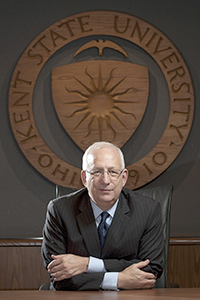Kent State president proposes cooperation with departments on campus to better university

Lefton. Photo by Matt Hafley.
September 4, 2012
#KWLefton
new TWTR.Widget({
version: 2,
type: ‘search’,
search: ‘#KWLefton’,
interval: 6000,
subject: ”,
width: 240,
height: 300,
theme: {
shell: {
background: ‘#b8b8b8’,
color: ‘#66a9c5’
},
tweets: {
background: ‘#b8b8b8’,
color: ‘#444444’,
links: ‘#1985b5’
}
},
features: {
scrollbar: true,
loop: true,
live: true,
hashtags: true,
timestamp: true,
avatars: true,
toptweets: true,
behavior: ‘default’
}
}).render().start();
View President Lefton’s letter at the bottom of this page.
President Lester Lefton sent a letter last month to full-time faculty that addressed some concerns he has about the university and asked the faculty for their input on issues of higher education.
In his letter dated Aug. 23, Lefton thanked faculty, shared his thoughts about “matters of growing gravity” and invited them to share theirs.
“Looking ahead, what are some of the issues we need to address together?” Lefton said in the letter. “I believe we must start by acknowledging that the environment in which public universities pursue their multi-faceted missions is in the throes of a major shift.”
Lefton cites some of his specific concerns in the letter, such as a lack of state funding, a change in the higher-education model and an emergence of doubts about the effectiveness of universities’ teaching methods.
He said the public is beginning to question the worth of higher education and are asking for cost-cutting measures.
“All at the same time, they’re demanding more graduates and more impact from our research and services, and debating faculty workloads, tenure and research relevance with skepticism,” Lefton said in his letter.
Lefton also said he plans to visit and work together with the different academic departments on campus to get feedback on the issues at hand.
Don White, Faculty Senate vice chairman, said he believes the letter was a surprise to many faculty members. White said he thinks it was an attempt to better communicate with staff because his remarks at Faculty Senate haven’t always been clear.
A letter sent on actual paper is much harder to ignore than an email, he added, where email can be deleted at the click of a button.
“The issues he addresses in the letter are certainly issues we will have to address,” White said.
George Garrison, professor of Pan-African studies and Faculty Senate at-large executive committee member, responded to the president’s letter with a statement of his own. Garrison said some the ideas floated in the letter could limit intellectual development by turning higher education into a corporate model.
“Our way of life, and the ability to fulfill human potential, depend on institutions of higher learning directing their energy, resources, talents, experience and know-how toward curricular that educate our youth, and not merely train them to function in the corporate system that benefits an elite few, only,” he wrote.
Garrison pointed out some of the issues mentioned in Lefton’s letter, such as the dream of higher education fading, the wavering worth of a college degree, the idea that the demand for students by employers will decline and the board of trustees taking a more active role in curricula.
“Universities are not businesses; students are not clients; professors are not workers; administrators are not managers; and University Presidents are not CEOs,” Garrison wrote in his statement.
Eric Mansfield, executive director of university media relations, said Lefton will try to schedule meetings with each academic department within the next couple of weeks.
Mansfield said even with Lefton’s busy schedule, the president is committed to hearing what faculty have to say about some of the challenges society poses to universities.
“It doesn’t take long for anybody chatting with him to know how much he values our staff, values our instructors, values our faculty, and he firmly wants to know what people have to think and what people have to say,” Mansfield said.
“But at the same time, he wanted people to know what he’s thinking and [to] kind of see the myriad of challenges now for all universities, especially public universities. Some of the obstacles out there that are financial, some that are societal, some that are educational; and say ‘Hey, here’s what I think. I’m going to be coming around. I want to know what you think.’”
Lefton ended the letter by encouraging faculty and staff to contact him by email if they had comments to make before he made his visits around the university. He said he will come to the table with an open mind.
“So I ask you to begin thinking about the issues for public universities and about questions such as, ‘How can we protect the academic values we cherish and at the same time become more accountable, competitive and effective?’” Lefton said.
Contact Alicia Balog at [email protected] and Audrey Fletcher at [email protected].
DV.load(“//www.documentcloud.org/documents/422085-1lefton-letter.js”, {
width: 650,
height: 875,
sidebar: false,
container: “#DV-viewer-422085-1lefton-letter”
});
























